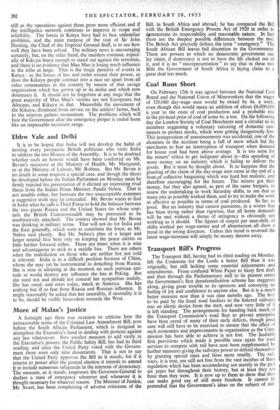Ebbw Vale and Delhi
It is to be hoped that India will not develop the habit of inviting every peripatetic British politician who visits India to address the two Houses of the Assembly. It is to be doubted whether such an honour would have been conferred on Mr. Bevan's successor at the Ministry of Health, Mr. Marquand, or at the Ministry of Labour, Mr. Robens. But Mr. Bevan is no doubt in some respects a special case, and though the thesis he developed before the Indian Parliament on Monday must be firmly rejected his presentation of it elicited an interesting rival thesis from the Indian Prime Minister, Pandit Nehru. That is not tenable either, but between the two Unacceptable extremes a suggestive truth may lie concealed. Mr. Bevan wants to find in India what he calls a Third Force to hold the balance between the two giants Russia and the United States (to whose coat- tails the British Commonwealth may be presumed to be unobtrusively attached). The context showed that Mr. Bevan was thinking in military terms. That will not do for India and the East generally, which were to constitute the force, as Mr. Nehru said plainly. But Mr. Nehru's plan of a larger and larger neutral bloc bent only on keeping the peace carries us iitde further forward either. There are times when it is wise and advantageous to stick to a middle line. There are others when the malediction on those who are neither hot nor cold is relevant. India is in a difficult position because of China, whom she may yet be instrumental in detaching from Russia. She is wise in adopting at the moment no such partisan atti- tude as would destroy any influence she has at Peking. But she need not and should not conceal her sympathies unduly. She has owed, and owes today, much to America. She has nothing but ill to fear from Russia and Russian influence. It might reasonably be asked that her neutrality, if neutrality it is to be, should be visibly benevolent towards the West.


































 Previous page
Previous page